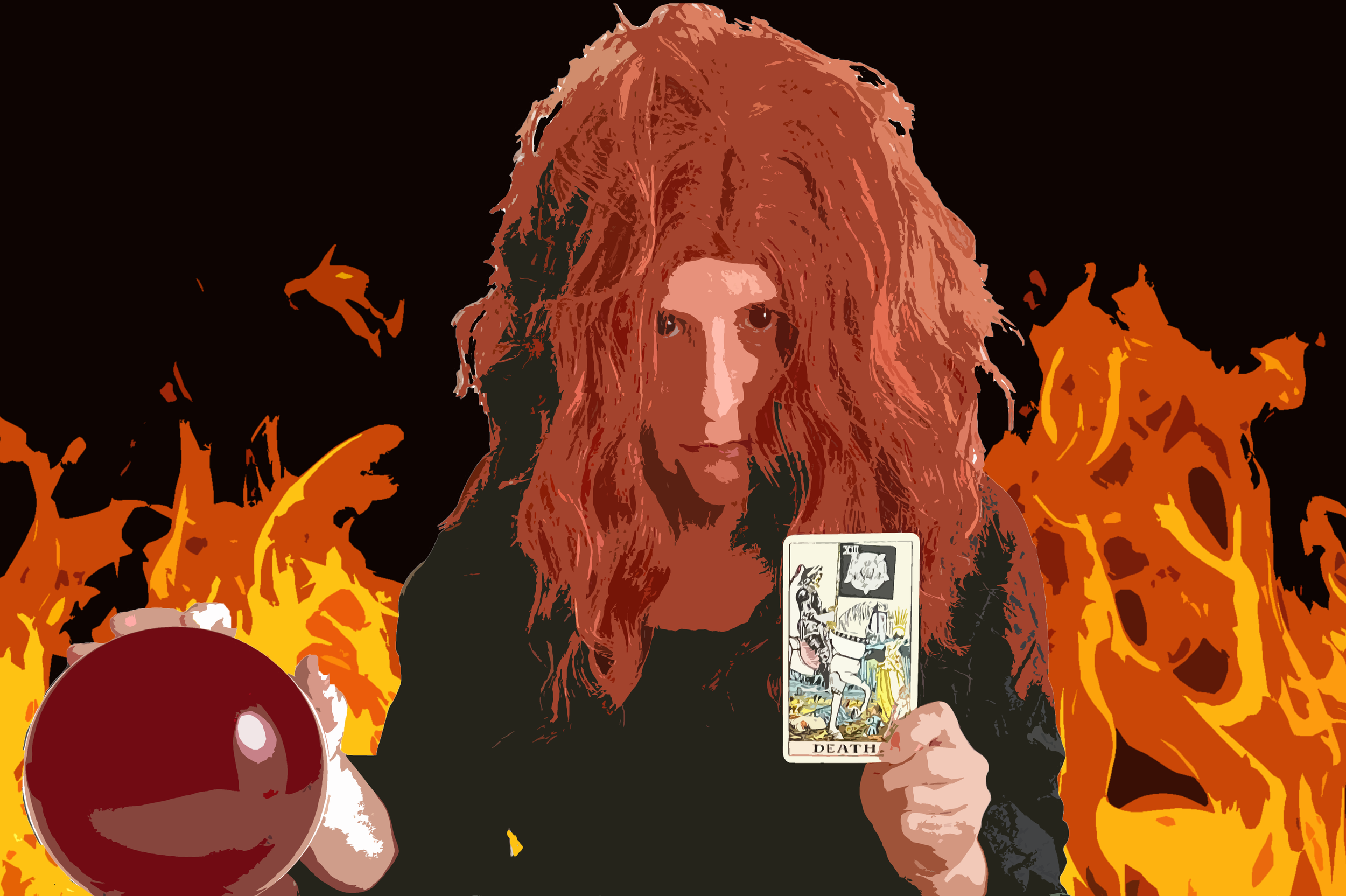
Fate deals - but death holds all the cards -
in Giuseppe Verdi’s opera of unbridled love, lust and revenge
il trovatore
Friday, march 21, 2025 AT 7:30 PM
Sunday, march 23, 2025 at 3:00 PM
Characters
Count di Luna, a nobleman to the Prince of Aragon
Manrico, a troubadour and officer in the army of the Prince of Urgel
Azucena, Manrico’s adoptive mother
Leonora, a noblewoman in love with Manrico
Ferrando, an officer of Count di Luna
Inez, Leonora’s confidant
Ruis, Manrico’s henchman
An old man
A messenger
-
Captain Ferrando warns the retainers to watch for the Count’s rival, Manrico, the troubadour. To keep them awake during their vigil, he tells the story of a woman who, years earlier, had cast a spell on the Count’s infant brother to make him ill. The Count’s father had the woman burned at the stake for witchcraft. To avenge her mother’s death, her daughter kidnapped the baby and burned him to death in the same spot where her mother had died. Ferrando has sworn to continue the search for the woman’s daughter.
-
Leonora is walking with her companion, Ines. Leonora pines for a mysterious champion who appeared at a tournament where she awarded him the victor’s laurels. Civil war broke out, and she did not see him for a long time. Then, one moonlit night, she heard a troubadour serenading her; it was he (“Tacea la notte placida”). Ines urges her to forget him, but she cannot, for she is so in love with him that she would die for him (“Di tale amor”). When they retire, the Count arrives. He is also in love with Leonora. He is about to go to her when he hears the voice of his romantic and political rival, Manrico, serenading her. Enraged, he hides and watches Leonora rush to meet her lover. The Count reveals himself and demands to know why Manrico dares to enter the palace precincts when he is under a death sentence. He challenges Manrico to an immediate duel, and the men rush off, with swords drawn, as Leonora falls in a faint.
-
Some men work at their anvils, singing a song about a beautiful maid (“Anvil Chorus”). Azucena, Manrico’s mother, then sings about a woman who was burned at the stake (“Stride la vampa”). When everyone leaves, Azucena tells Manrico the true story behind the song, the story of his grandmother’s terrible death at the hands of the previous Count di Luna (“Condotta ell’era in ceppi”). She remembers her mother’s dying cry, “mi vendica” (Italian: “avenge me”). To do so, Azucena kidnapped the previous count’s infant son with the intent to kill him. In a surreal moment, she threw her own baby into the flames, and thereafter she raised the count’s son as her own. Hearing this, Manrico realizes that he must not be her son, but Azucena hastily assures him that he is. She reminds him that she lovingly nursed his wounds after his recent duel with the present count, and she asks Manrico why he had not killed the other man. He cannot explain it; he only knows that some mysterious force stayed his hand (“Mal reggendo all’aspro assalto”). Azucena urges him to kill the Count if he gets another chance, and Manrico swears to do so. A messenger, Ruiz, arrives with a letter informing Manrico that his men have taken the town of Castellor. Ruiz adds that, believing Manrico to have been killed earlier in battle, Leonora has decided to enter a convent there. Manrico rushes to Leonora as Azucena tries in vain to stop him.
-
The Count, Ferrando, and the retainers have arrived to intercept Leonora. Believing Manrico to be dead, the Count vows that Leonora will be his (“Il balen del suo sorriso”). As the church bell rings, the Count orders Ferrando and the others to hide. Not even God can take Leonora from him, he says, as the sound of the nuns’ voices in prayer is heard (“Per me ora fatale”). Leonora, Ines, and a group of women arrive. Leonora consoles her friends, commending herself to God in hopes of meeting Manrico in the afterlife. But the Count bursts in on her, demanding that she marry him. At that, Manrico appears. Leonora is stunned by disbelief and joy as the two men and their retainers threaten each other (“E deggio e posso crederlo?”). Manrico’s followers disarm the Count, allowing the lovers to flee.
-
The soldiers are looking forward to the attack on the fortress at Castellor (“Squilli, echeggi la tromba guerriera”), where Manrico has taken Leonora. The Count is haunted by the image of Leonora in Manrico’s arms. Ferrando arrives with the news that a woman acting suspiciously has been found wandering near the camp. Azucena, bound, is brought in by the guards. The Count interrogates her, suspecting that she is the woman who had murdered his infant brother. Although Azucena denies it, Ferrando identifies her. The Count is triumphant, and he exults in his new power over his enemy after Azucena cries out to Manrico to save her. She warns the Count that God will punish him, but the Count relishes the idea of tormenting Manrico by torturing his mother, thus exacting complete revenge for his brother’s death (“Deh! rallentate, o barbari”). Azucena is dragged off, condemned to die at the stake.
-
Manrico tells Leonora that the Count will attack at dawn, but he assures her that he will prevail. He asks his follower, Ruiz, to make everything ready for the battle while he and Leonora marry in the chapel. The loving pair are about to enter the chapel when Ruiz hurriedly returns with the news that Azucena has been captured and is about to be burned. Manrico vows to save his mother from the flames or else die with her (“Di quella pira”).
-
Ruiz tells Leonora that Manrico is now imprisoned in the tower, having been sentenced to death by beheading. She implores the wind to take her sighs of love to him (“D’amor sull’ali rosee”). At the doleful sound of monks at prayer, Leonora shivers, then she hears Manrico crying out farewell to her (“Miserere”). She vows to save his life. The Count enters with some of his retainers; she hides in the shadows. The Count orders the executions of Manrico and Azucena at dawn. He blames Leonora for driving him to this extreme, for he has searched Castellor for her in vain. She suddenly appears, however, and begs for mercy for Manrico. But the more she expresses her love for Manrico, the more enraged the Count becomes. Finally, she offers herself to him in marriage if he will spare Manrico. He makes her swear that she will do it. She agrees, but she secretly drinks the poison that she has concealed in her ring. Meanwhile, the Count agrees to let Manrico live, and he takes Leonora into the tower.
-
Item descriptionIn the dungeon with her son, Azucena, exhausted and terrified, relives her mother’s execution as Manrico tries to calm her. She dreams that they will go back to their old peaceful life in the mountains (“Ai nostri monti”). When Azucena falls asleep, Leonora enters with the news that Manrico’s life has been spared. She urges him to flee but says she cannot come with him. Manrico refuses to leave without her. Upon realizing the bargain she has made, he accuses her of having sold herself to the Count. When he curses her, she reveals that she has poisoned herself, and Manrico is overcome with remorse. She dies just as the Count enters. He orders his soldiers to take Manrico to the block. When Azucena awakes, asking for Manrico, the Count drags her to the window to watch her son’s execution. As the deed is done, Azucena reveals to the horrified Count that the man he just killed was his own brother. As the news devastates the Count, Azucena exults that her mother’s murder is avenged.

